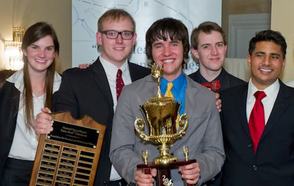Ethics Bowl 101

June 7, 2016
This past spring a team of five DePauw students traveled to Cleveland to compete in the National Bioethics Bowl. Though their tournament run ended just short of the finals, the team maintained DePauw’s presence at the top tier of competition.
DePauw has competed in the National Bioethics Bowl for five years, winning the national championship in its first year of participation in 2012, while DePauw's Collegiate Ethics Bowl team has qualified for national competition in nine out of the last 12 years, winning the national championship in 2013.
“We have done very well over the years, and have created an intellectual community that is important to people, usually when people do it they want to do it again,” says Marcia McKelligan, professor of philosophy and coach of the teams. Robert D. Newton, professor emeritus of philosophy, assists in coaching the Ethics Bowl team, and Ted R. Bitner, assistant professor of psychology, is a co-coach for Bioethics Bowl.
The ethics teams have always had club status, but starting fall semester 2016, students will be able sign up to train for competition in a traditional class setting. In past years, student members have needed to make substantial time commitments in order to prepare for competition. Because it was a cocurricular activity, students worked around their already busy schedules in order to devote time – often evenings and weekends – to group discussion, reading, and argument construction and defense. “Our biggest challenge as a club was finding a time when everyone could meet, and there was no single practice where every person was there,” McKelligan says.
During the class this fall, students will be given the scenarios constructed by the national committees for the competitions, and taught how to construct and defend arguments. According to McKelligan, the class will consist of practice responding to another team’s hypothetical speech, determining what the morally relevant issues are, and trying to anticipate what kind of objections could be raised. She says that group work is essential to this kind of training because “many minds are better than one,” especially when it comes to identifying all the nuances of a case and combatting preconceptions. One major component of the competition is the ability to prepare a thesis and deliver a speech without notes. She believes the graded aspect of the class will help enhance performance alongside the benefits of three-days of class per week, and a three-hour evening lab.
McKelligan is excited to have a “particular time bank” to work with students and train for the Ethics Bowls. “This new class will make the time commitment much easier for students to meet as a group,” she says.
And that can only mean their success will continue.
Back